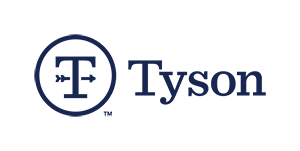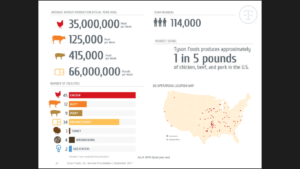A Heifer Sized Problem for Tyson Foods

Demand for beef is expected to increase as income levels rise and the global population grows to exceed 9bn by 2050. However, beef production is a key contributor to climate change, producing ~3 tonnes of CO2 equivalent emissions annually, polluting water resources, and encouraging deforestation. As the largest US fed beef packer, with beef accounting for 38% of the Company’s $37bn in sales for 2016, Tyson Foods should be focused on solutions to achieve its mission to “sustainably feed the world with the fastest growing portfolio of protein packed brands.”
What’s the Problem?
Americans consumed 24.8bn pounds of beef in 2015[i], and while those dishes may have been delicious, beef has a dark side and is a core culprit impacting climate change:
- CO2 emissions: According to The UN Food and Agriculture Organization (FAO), beef production accounts for 41% of the 7.1 gigatonnes of CO2 equivalent emissions produced annually by the livestock sector. Of this, feed production, processing and transport account for ~45% of total emissions, 39% are due to outputs of greenhouse gases (GHG) during digestion by cows, and 10% is attributable to manure decomposition[ii].
- Resource consumption: According to the WWF, significant amounts of water are used to grow feed, and >66% of the world’s agricultural land is used to raise cattle, more than all other domesticated animals and crops combined[iii]. Furthermore, the WWF discloses that each year, a rainforest area larger than New York State is destroyed to create grazing land[iv]. The overgrazing and the use of land to grow feed is a key contributor to soil erosion[v].
- Pollution: The improper treatment of cattle production waste leads to pollution of the earth’s finite water resources, and improper grazing management results in sediment which contaminates surface water and groundwater[vi].
Demand for beef is expected to increase as income levels rise and the global population grows to exceed 9bn by 2050[vii]. As the largest US fed beef packer, with beef accounting for 38% of the Company’s $37bn in sales for 2016[viii], Tyson Foods should be focused on solutions to achieve its mission to “sustainably feed the world with the fastest growing portfolio of protein packed brands”[ix].
Figure 1. Tyson Foods Factbook[x]
Source: Tyson Foods, Inc. Investor Presentation (September 2017)
So, What’s Tyson Doing?
Tyson has been careless. In 2016, Tyson was accused of dumping >104mm pounds of pollutants in waterways from 2010-2014, which is more than Cargill, Koch Industries, and ExxonMobil combined[xi]. In 2017, Tyson agreed to pay a $2mm criminal fine and pay $0.5mm to clean up impacted water in Missouri, where the Company released animal feed into a city wastewater treatment system[xii].
However, Tyson has been trying to clean up its act:
- CO2 emissions: Tyson measures CO2 equivalent emissions annually, and is reducing transport miles, using recyclable packaging materials, and investing in upgrades across its facilities to improve energy efficiency and reduce emissions. Tyson is also using renewable fuels, e.g., by implementing covered wastewater treatment lagoons at six production locations to capture biogas for use as a renewable energy source[xiii].
- Resource consumption: In 2016, Tyson began installing new measuring/monitoring equipment in US plants so employees could manage water use in real-time, with the goal of reducing the amount of water used to produce each pound of product by 12% by the end of 2020, using 2015 as a base year. The Company also used more than 2bn gallons of wastewater for irrigation across their plants[xiv].
- Pollution: Tyson has implemented an Environmental Management System (EMS) across its 12 plants, which have all achieved at least Tier 3 recognition[xv].
Is That Enough?
Definitely not.
- Clearer reporting: Tyson has not set quantifiable targets and timelines for each of its goals, which diminishes the Company’s accountability. Furthermore, Tyson aggregates its results across all three products (poultry, beef and pork), and across the entire supply chain, so that efficiencies for a subgroup (e.g., beef) cannot be clearly monitored. If Tyson is serious about sustainability, it needs to be more transparent in both its goals and its reporting.
- Sustainable sourcing: According to the FAO, improving efficiencies and implementing best practices at the herd level can markedly reduce GHG emissions (e.g., better feeding can reduce methane released during digestion and nitrous oxide released by decomposing manure)[xvi]. Tyson purchases its cattle from independent feed yards, public auctions, and the spot market[xvii], and needs to take greater responsibility for ensuring its suppliers implement best practices. Tyson should go so far as to implement practices similar to the “Sustainable Ranching Initiative” undertaken by the WWF, which collaborates with ranchers “to identify and accelerate the use of more ecological and economically sustainable management practices”[xviii].
- Plant based protein: In 2016, Tyson acquired a 5% stake in plant-based protein company Beyond Meat for an undisclosed amount[xix], but spent $4.2bn in 2017 to acquire the animal-protein focused AdvancePierre Foods[xx]. Tyson needs to invest more in plant based protein.
Enforcing best practices at the beginning of the cattle supply chain is critical to sustainable production. Considering Tyson’s mission statement and significant purchasing power, shouldn’t Tyson be held responsible for implementing standards for its suppliers adhere to, and helping them achieve these standards? More radically, shouldn’t Tyson be responsible for investing more in plant based protein, and shaping consumer food habits over the long term?
Word Count: 799
Sources
[i] USDA Foreign Agricultural Service website, “Statistics & Information”, https://www.ers.usda.gov/topics/animal-products/cattle-beef/statistics-information.aspx, Accessed November 2017
[ii] Gerber, P.J., Steinfeld, H., Henderson, B., Mottet, A., Opio, C., Dijkman, J., Falcucci, A. & Tempio, G. 2013, (PDF file) “Tackling climate change through livestock – A global assessment of emissions and mitigation opportunities”, Food and Agriculture Organization of the United Nations (FAO), Rome, http://www.fao.org/3/a-i3437e.pdf, Accessed November 2017
[iii] WWF, “Sustainable Agriculture – Beef”, https://www.worldwildlife.org/industries/beef, Accessed November 2017
[iv] WWF, “Sustainable Agriculture – Beef”, https://www.worldwildlife.org/industries/beef, Accessed November 2017
[v] WWF, “Sustainable Agriculture – Beef”, https://www.worldwildlife.org/industries/beef, Accessed November 2017
[vi] WWF, “Sustainable Agriculture – Beef”, https://www.worldwildlife.org/industries/beef, Accessed November 2017
[vii] WWF, “Sustainable Agriculture – Beef”, https://www.worldwildlife.org/industries/beef, Accessed November 2017
[viii] Tyson Foods, Inc. Investor Presentation (September 2017), Page 52, http://s1.q4cdn.com/900108309/files/doc_presentations/2017/09/TSN-Investor-Presentation-September-2017.pdf, Accessed November 2017
[ix] Tyson Foods, Inc. Investor Presentation (September 2017), Page 19, http://s1.q4cdn.com/900108309/files/doc_presentations/2017/09/TSN-Investor-Presentation-September-2017.pdf, Accessed November 2017
[x] Tyson Foods, Inc. Investor Presentation (September 2017), Page 51, http://s1.q4cdn.com/900108309/files/doc_presentations/2017/09/TSN-Investor-Presentation-September-2017.pdf, Accessed November 2017
[xi] Hannah Furlong, “Tyson Foods Dumps More Pollution Into Waterways Each Year Than ExxonMobil”, Sustainability Brands, February 12, 2016, http://www.sustainablebrands.com/news_and_views/behavior_change/hannah_furlong/tyson_foods_dumps_more_pollution_waterways_each_year_e, Accessed November 2017
[xii] Susan Heavey, Theopolis Waters, “Tyson poultry pleads guilty over Missouri spill, to pay $2 mln fine”, Reuters, September 27, 2017, https://www.reuters.com/article/legal-tyson-foods-missouri/tyson-poultry-pleads-guilty-over-missouri-spill-to-pay-2-mln-fine-idUSKCN1C22FN, Accessed November 2017
[xiii] Tyson Foods, Inc., “Sustainability”, http://www.tysonsustainability.com/healthier-environment, Accessed November 2017
[xiv] Tyson Foods, Inc., “Sustainability”, http://www.tysonsustainability.com/healthier-environment, Accessed November 2017
[xv] Tyson Foods, Inc., “Sustainability”, http://www.tysonsustainability.com/healthier-environment, Accessed November 2017. According to Tyson, the program begins with Tier 1 as a basic environmental commitment and advances to Tier 4 which recognizes an ISO 14001 management system
[xvi] Food and Agriculture Organization of the United Nations, “Key facts and findings: By the numbers, GHG emissions by livestock”, http://www.fao.org/news/story/en/item/197623/icode/, Accessed November 2017
[xvii] Tyson Foods, Inc. Annual Report (September 2017), Page 3, http://s1.q4cdn.com/900108309/files/doc_financials/2017/Q4/Tyson-2017-10K.pdf, Accessed November 2017
[xviii] WWF, “Sustainable Agriculture – Beef”, https://www.worldwildlife.org/industries/beef, Accessed November 2017
[xix] “Why I Am Welcoming Tyson Foods As An Investor To Beyond Meat”, Beyond Meat Press Release, October 10, 2016, on BeyondMeat website, http://beyondmeat.com/whats-new/view/why-i-am-welcoming-tyson-foods-as-an-investor-to-beyond-meat , Accessed November 2017
[xx] “Tyson foods to acquire AdvancePierre foods for $40.25 per share in cash”, Tyson Foods Press Release, April 25, 2017, on Tyson website, http://ir.tyson.com/investor-relations/news-releases/news-releases-details/2017/Tyson-Foods-to-Acquire-AdvancePierre-Foods-for-4025-Per-Share-in-Cash/default.aspx, Accessed November 2017



Rasha, your essay raises very pertinent questions on who should bear the responsibility and accountability for sustainable business practices. I feel this is a conundrum not only for beef production, but for agriculture generally and indeed all business practices more broadly. Whilst I agree that Tyson should be doing more as per their mission statement and given their sheer size and influence on the industry, I believe the responsibility for promoting more sustainable eating habits ultimately lies with consumers themselves.
If consumers move towards a less meat heavy diet, insist on purchasing meat sourced from restaurants and grocery stores (i.e. Tyson’s customers), and ensure elected representatives legislate and provide appropriate incentives for sustainable practices, then companies like Tyson will be forced to implement higher standards throughout the supply chain rather than having to make difficult choices between ethical and business decisions. For example, in 2007 Tyson and ConocoPhillips formed an innovative joint venture to produce 175 million gallons of biodiesel a year (about 3% of ConocoPhillips’s annual US diesel production) from animal fats which are a byproduct of Tyson’s processes, but in 2009 Conoco suspended the collaboration after federal tax credits for the project were cut in half. If consumers ensured governments did not remove these incentives, pushed for more stringent regulatory requirements, and changed their eating and purchasing habits, Tyson wouldn’t have the dilemma of pondering such trade-offs.
References:
[1] http://www.nytimes.com/2007/04/17/business/17diesel.html
[2] https://www.wsj.com/articles/SB124224783714216593
Rasha, thanks for sharing. Your post got me thinking about a few issues:
1. The need for consummative regulation – on Sales of $37 Bn, Tyson was fined just $2.5 Mn for very irresponsible social behaviour, which is unlikely to be a strong enough incentive to change behaviour. Assuming the firms primary goal is profit maximisation (like all good Neoclassical Economists), governments need to impose stronger regulations. This should be in conjunction with social and media pressure, which is likely to be more effective – but in combination with regulation climate change stands a stronger chance!
2. Plant based protein seems like a good solution, however will traditional consumers used to their ‘beef’ burgers be willing to switch? What type of marketing and awareness campaigns would be effective to create demand for soya or plant based meats? Moreover, will the price be attractive and how will the taste compare? Ideally if the product is comparable on taste and quality, the industry has only one role around customer education.
It’s helpful to have additional context on the destructive practices that occur with food supply chains and certainly unfortunate to see Tyson’s issues with respect to waterway pollution. The fact that this water quality issue surpasses Kock, Cargil and Exxon in aggregate is simply unacceptable and tough to confront from many aspects.
Completely agree that Tyson should be held to a higher standard, and would hope that additional granularity / focus would be implemented across all sustainability measures. The reality is that organizations with these issues are only incentivized to change once regulation, executive accountability, and public perception/awareness are aligned. The average consumer of Tyson’s products is more than likely unaware of the inadequate sustainability measures in this case; I suspect meaningful changes would be seen if and only if the broader public has a better education of these topics thus forcing elected officials to enact tougher regulations in this space.